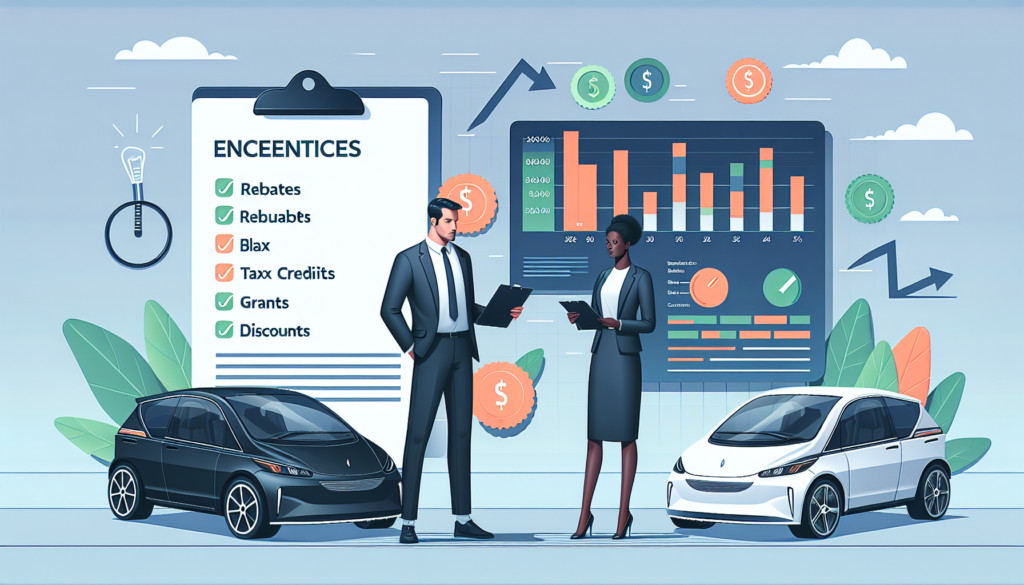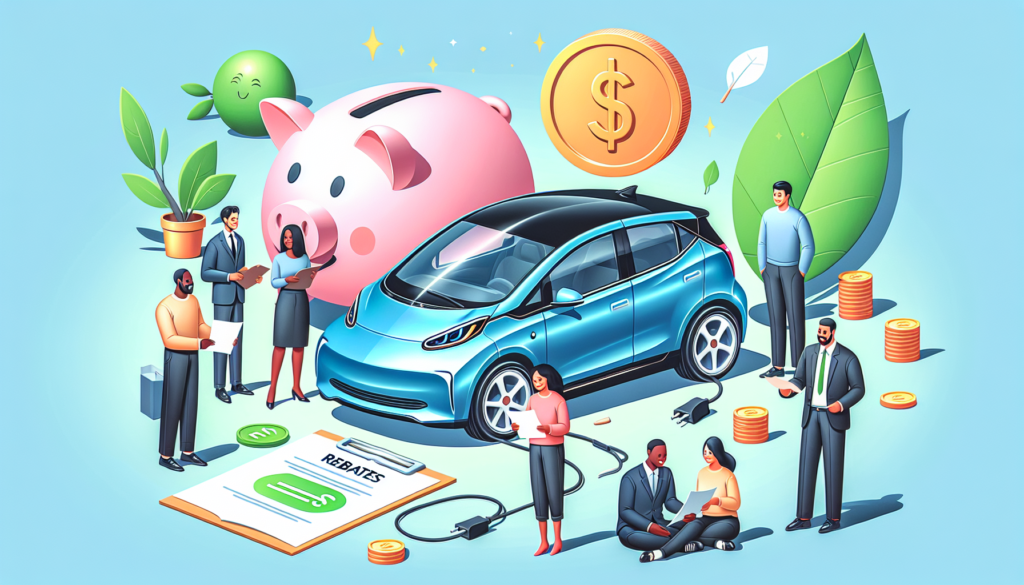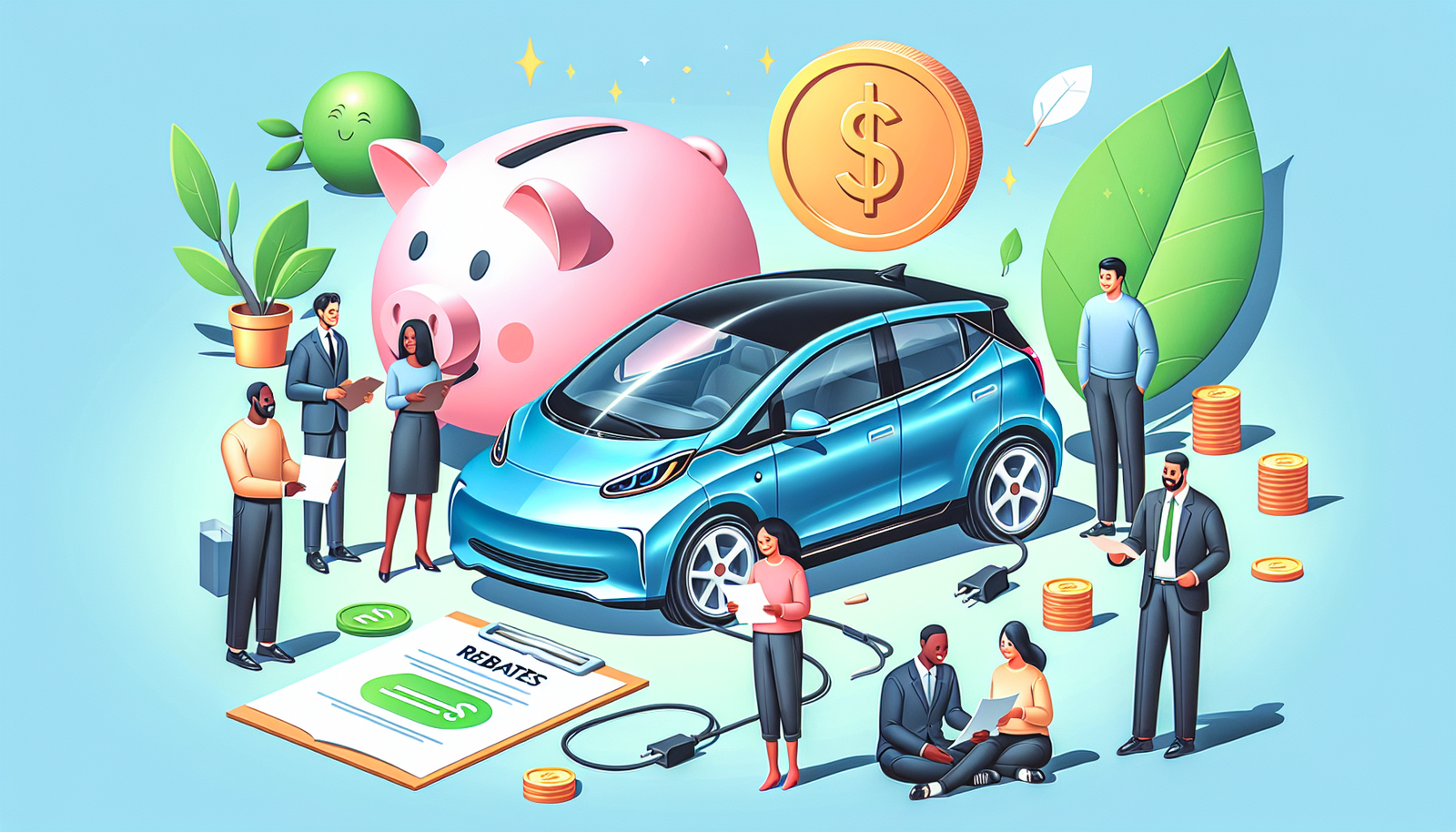Did you know that you may be eligible for rebates when you purchase an electric car? With the growing popularity of electric vehicles, many governments and organizations are offering financial incentives to encourage more people to switch to clean and sustainable transportation. These rebates can help offset the cost of buying an electric car, making it more affordable for you to make the switch. So, if you’re considering purchasing an electric car, it’s definitely worth looking into the various rebate programs available in your area. Let’s explore the exciting possibilities of rebates for purchasing electric cars!

Federal Government Rebates
Federal Tax Credit
The federal government offers a tax credit as a rebate for purchasing electric cars. This tax credit allows you to deduct a certain amount from your federal income tax return. The specific amount of the tax credit varies depending on the capacity of the battery used in the electric car. The tax credit is aimed at encouraging more people to choose electric vehicles and reduce their carbon footprint.
Cash Rebates
In addition to the federal tax credit, the government also provides cash rebates for purchasing electric cars. These cash rebates are given directly to the consumer and can help offset the upfront cost of buying an electric vehicle. The exact amount of the cash rebate varies depending on the state and the specific program, but they can be a significant financial incentive to go electric.
Grants and Incentives
Government grants and incentives are another way in which the federal government supports electric car adoption. These grants can be used to develop charging infrastructure, promote research and development of electric vehicle technology, and support various initiatives to increase the accessibility and affordability of electric cars. These grants and incentives aim to stimulate the growth of the electric vehicle market and accelerate the transition to sustainable transportation.
State and Local Government Rebates
State Tax Credits
Similar to the federal government, many state governments also offer tax credits for purchasing electric cars. These state tax credits can be in addition to the federal tax credit, further reducing the overall cost of an electric vehicle. Each state has its own set of rules and regulations regarding the tax credits, so it’s important to research and understand the specific incentives available in your state.
Cash Rebates
State and local governments may also provide cash rebates for purchasing electric cars. These cash rebates can vary in amount, eligibility criteria, and availability, so it’s essential to check with your state or local government to see what rebates are available. These cash rebates can significantly lower the upfront cost of an electric vehicle and make it a more financially viable option for many consumers.
Sales Tax Exemptions
Some states offer sales tax exemptions for electric car purchases. This means that when you buy an electric vehicle, you won’t have to pay the usual sales tax that’s applicable to other types of vehicles. Sales tax exemptions can save you a substantial amount of money and make buying an electric car more affordable.
Special HOV Lane Access
In certain states, electric car owners are granted special access to high-occupancy vehicle (HOV) lanes, even if they are driving alone. This perk allows electric vehicle owners to bypass traffic congestion and reach their destinations more quickly. Access to the HOV lane can be a valuable incentive for electric car owners who value time and want to enjoy a smoother commuting experience.
Utility Rate Incentives
Some state and local governments work in collaboration with utility companies to provide special rate incentives for electric vehicle owners. These incentives can include lower charging rates during off-peak hours or discounted electricity rates specifically for electric car charging. These incentive programs aim to encourage the use of electric vehicles and promote energy efficiency.
Manufacturer Rebates
Cash Incentives
Automobile manufacturers often offer cash incentives for purchasing their electric car models. These cash incentives can vary in amount and may be subject to certain conditions, such as purchasing or leasing through a specific dealership or meeting certain eligibility criteria. These manufacturer rebates can further reduce the cost of purchasing an electric vehicle and make it an even more attractive option for buyers.
Lease Deals
Leasing an electric car can be an appealing option for those who prefer lower upfront costs and flexibility. Many manufacturers offer lease deals specifically for electric cars, including discounted monthly payments and reduced or waived down payments. Leasing can be a cost-effective way to experience the benefits of electric cars without the long-term commitment of ownership.
Low-Interest Financing
To encourage the adoption of electric vehicles, some manufacturers provide low-interest financing options specifically for electric car purchases. These financing deals can include lower interest rates or even 0% APR financing for a certain period. This can result in significant savings over the life of the loan and make owning an electric car more affordable for many buyers.
Utility Company Rebates
Plug-In Electric Vehicle Rates
Utility companies may offer specific rate plans for electric vehicle owners. These rate plans are designed to incentivize off-peak charging, often offering lower electricity rates during designated time periods. By taking advantage of these rate plans, electric vehicle owners can save money on their charging costs and make the most of their vehicle’s efficiency.
Charging Station Rebates
Utility companies may also provide rebates for installing electric vehicle charging stations at home or in other locations. These rebates can help offset the cost of purchasing and installing the charging equipment, making it more affordable for individuals or businesses to adopt electric vehicle charging infrastructure.
Time-of-Use Plans
Time-of-use plans offered by utility companies allow electric vehicle owners to take advantage of different electricity rates based on the time of day. These plans typically offer lower rates during off-peak hours, incentivizing electric vehicle owners to charge their cars during those times. By charging during off-peak hours, you can save on electricity costs and potentially reduce strain on the grid during peak demand times.
Peak Demand Reduction Incentives
To promote a more balanced and efficient electric grid, some utility companies offer peak demand reduction incentives. These incentives encourage electric vehicle owners to manage their charging patterns to avoid charging during peak demand times. By reducing the demand on the grid during peak hours, electric vehicle owners can contribute to a more stable and sustainable energy system.

Non-Profit and Private Organization Rebates
Foundations and Funds
Non-profit organizations and private foundations may provide rebates or grants for purchasing electric cars. These rebates can vary in amount and eligibility criteria, and they often aim to support specific environmental or sustainability goals. Researching and connecting with local non-profit organizations and private foundations can help you discover additional rebate opportunities and financial assistance options.
Environmental Programs
There are various environmental programs supported by non-profit organizations and private entities that offer rebates for purchasing electric cars. These programs are usually focused on reducing greenhouse gas emissions, promoting clean energy, and fostering sustainability. By participating in these programs, you not only save money but also contribute to a greener and healthier planet.
Local Initiatives
In many communities, local initiatives are put in place to encourage electric vehicle adoption. These initiatives can range from rebate programs to free or discounted charging infrastructure installations. Local governments, non-profit organizations, and private entities collaborate to create these incentives and make electric cars more accessible and affordable for residents.
Employer Incentives
Charging Infrastructure Installation Assistance
Some employers may offer assistance or incentives for employees to install electric vehicle charging infrastructure at their homes. This can include financial support, guidance, or partnerships with local charging equipment providers. By providing assistance in charging infrastructure installation, employers encourage their employees to adopt electric vehicles and support sustainable transportation.
Financial Incentives for Employee Purchase/Lease
Employers can also offer financial incentives specifically for their employees to purchase or lease electric cars. These incentives can vary and may include cash rebates, additional subsidies, or contributions towards the down payment. Employer incentives can significantly reduce the cost of an electric vehicle for employees and further incentivize the adoption of electric cars.
Corporate Fleet Discounts
Companies with large vehicle fleets have a unique opportunity to transition their fleet to electric vehicles. To encourage this shift, many vehicle manufacturers offer corporate fleet discounts for purchasing electric cars in bulk. These discounts can result in substantial savings for companies and make electric vehicles a more cost-effective option for their fleet.
Incentives for Low-Income Individuals
Income-Based Discounts
To make electric cars more accessible to low-income individuals and families, some programs offer income-based discounts. These discounts are specifically tailored to income levels and can substantially lower the purchase or lease price of an electric vehicle. By providing income-based discounts, these programs aim to ensure that electric cars are not only an option for the affluent but also for those with lower incomes.
Subsidized Lease Programs
In addition to income-based discounts, there are subsidized lease programs available for low-income individuals. These programs offer reduced monthly lease payments, lower down payment requirements, or even waived down payments. Subsidized lease programs make it more affordable for low-income individuals to experience the benefits of electric cars without the financial burden of a traditional car purchase.
Affordable Charging Options
To address the concern of charging accessibility for low-income individuals, certain programs provide affordable charging solutions. These can include the installation of public charging stations in low-income neighborhoods or offering discounted rates for charging at existing stations. These initiatives aim to ensure that cost is not a barrier for low-income individuals who wish to own and operate an electric car.
Incentives for Electric Car Charging Infrastructure
Installation Rebates
To encourage the installation of public and private charging stations, various rebate programs are available. These programs offer rebates to individuals, businesses, municipalities, or organizations for installing charging infrastructure. The rebates can cover a significant portion of the installation costs, making it more financially viable for more entities to invest in charging infrastructure.
Tax Credits
There are also tax credits available for the installation of electric car charging infrastructure. These tax credits can offset a portion of the expenses incurred for installing charging stations, including both the equipment and installation costs. Taking advantage of these tax credits can make the overall investment in charging infrastructure more cost-effective.
Grants for Public Charging Stations
Governments at different levels and non-profit organizations often provide grants specifically for the development of public charging stations. These grants can cover a substantial portion of the expenses associated with installing public charging infrastructure. Increasing the availability of charging stations promotes the growth of electric vehicle adoption and provides convenience for electric car owners.
Incentives for Used Electric Cars
State and Local Rebates
While most rebates and incentives are typically associated with new electric car purchases, some states and local governments also offer rebates for used electric cars. These rebates can provide financial incentives for individuals considering buying a pre-owned electric vehicle, lowering the overall cost of ownership.
Manufacturer Incentives
Some manufacturers may offer incentives or rebates specifically for used electric cars. These incentives aim to make used electric cars more attractive to potential buyers and can go a long way in reducing the purchase price or providing additional benefits, such as warranty coverage or complimentary maintenance services.
Financial Assistance Programs
Various financial assistance programs exist to support the purchase of used electric cars. These programs offer low-interest loans, grants, or subsidies to qualified individuals who wish to purchase a pre-owned electric vehicle. These financial assistance programs help make used electric cars more affordable and accessible to a wider range of buyers.
How to Find and Apply for Rebates
Federal Government Websites
To find information about federal government rebates and incentives for electric cars, visit the official websites of relevant government agencies such as the Department of Energy or the Internal Revenue Service (IRS). These websites provide up-to-date information on federal tax credits and other incentives, as well as guidance on how to apply for and claim these rebates.
State and Local Government Websites
To explore rebates and incentives offered by state and local governments, visit the official websites of the respective government agencies responsible for these programs. State departments of transportation, energy, or environmental protection often provide information on tax credits, cash rebates, sales tax exemptions, and other incentives available in their jurisdiction.
Manufacturer Websites
Automobile manufacturers have dedicated sections on their websites that provide information on current rebates, incentives, and special offers for electric cars. By visiting the manufacturer’s website, you can find details about the specific cash incentives, lease deals, or low-interest financing options they offer for their electric vehicle models.
Utility Company Websites
If you are interested in rebates and incentives provided by utility companies, utility company websites are a valuable resource. These websites often have dedicated sections that outline any special rate plans, charging station rebates, or time-of-use plans available to electric vehicle owners. Utility company websites also provide information on how to enroll in these programs and take advantage of the incentives.
Non-Profit and Private Organization Websites
Non-profit organizations and private entities that offer rebates or grants for electric vehicles usually have information about their programs and application processes on their websites. Researching and visiting the websites of these organizations can provide valuable insights into additional rebate opportunities and financial assistance programs.
Finding and applying for rebates may require some research and paperwork, but the financial incentives and savings you can gain make it worth the effort. Take advantage of the various resources available online and reach out to local government agencies, non-profit organizations, and electric vehicle manufacturers to uncover all the rebates and incentives that may be available to you. By leveraging these programs, you can make owning an electric car more affordable and contribute to a greener future.

